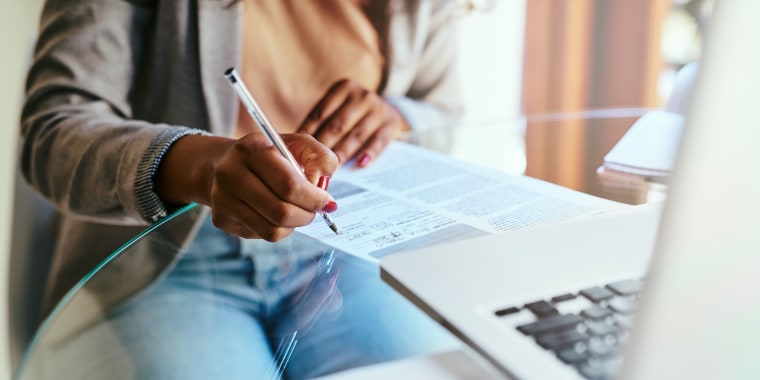Amid the pandemic, everything looks different — even something as inevitable as tax season.
In fact, the pandemic may affect the way you pay your taxes this year. NBC News senior business correspondent Stephanie Ruhle answered some of the most common questions about what tax changes you might need to know about.
1. When are taxes due this year?
The tax filing deadline for taxpayers has been pushed back from April 15 to May 17, the Treasury Department and the Internal Revenue Service announced Wednesday.
The one-month extension applies both to filings and payments. This is only for federal income taxes, not state income taxes so don't delay in getting your tax materials ready to file.
2. Why should I file early?
Ruhle said that there are several benefits to filing early.
If you think you will owe money, filing early will give you more time to pull together funds for any payments you may need to make. Having that time to get money together can help you avoid paying interest or penalties on top of your taxes.
If you're owed money, the sooner you get the paperwork in, the sooner you'll get your refund, or any stimulus money that you may be owed! According to Ruhle, tax preparers say that filing online with direct deposit is the "most foolproof way" to get your refund on time.
Even if you usually file on paper, consider using digital options this year: Paper checks may be seriously delayed due to the pandemic.
3. How do I file my taxes if I moved?
Many people who abruptly started working from home quickly realized that they could do their jobs from anywhere. Whether that meant renting a house for a few months or moving to a new state permanently, it could affect the way you file your taxes.
"If you kept your job and moved to another state for a few months (or) maybe permanently, you could be on the hook to pay state taxes in more than one place," said Ruhle. "If you didn't pay any taxes (in your new state) since you moved, you might even have to pay interest and penalties."
If this is the situation you're in, Ruhle recommends consulting with a professional. Different states have different rules — for example, in New York and New Jersey, one state offers credit for taxes you pay in the other state if you live in one and work in the other.
"It gets complicated," Ruhle said. "A lot depends on where your job is based and where you moved to. The pandemic has made all of our lives a lot more complicated. This might be one of those years it's worth spending money to get some professional help to save money."
4. Can I deduct the cost of my home office?
Carrie, a teacher who has been working from home during the pandemic, said that she set up her home office to be used solely as a "classroom" since March, when the pandemic first hit. Like many others, she was wondering if she could deduct the cost of that project from her taxes.
"I hate to tell you this, but most likely, no," said Ruhle. "If you are an employee — you get a W2 — when it comes to your federal taxes, you aren't going to be able to deduct your home office or anything you bought for work, like a printer or note pads."
There may be some exceptions: Ruhle noted that people who are self-employed or who own their own businesses and work from home might be able to deduct some expenses related to working from home.
5. How does taking money out of a retirement affect my taxes?
Frank Duffy and his wife cashed in portions of their 401(k)s to keep financially afloat during the pandemic. He asked Stephanie on Twitter Now, he wants to know if there's any tax rules that will help out people who may be taxed for taking money out of retirement accounts early.
Ruhle said that the question comes down to whether or not you were "affected directly" by the coronavirus. Normally, if you take money out of your 401(k) or 403(b) account before the age of 60 59 and a half, you can face a 10% early withdrawal penalty, on top of any taxes you might owe. But due to the CARES Act passed earlier in the pandemic, people can withdraw up to $100,000 from those retirement accounts with no penalty and take up to three years to pay any associated taxes if the virus impacted you and your family. If you decide to repay the money you took out of the accounts and fully repay the amount within three years, you can get back the taxes you paid.
Situations that qualify would be if you, your spouse, or a dependent got sick, or if your family lost income due to the pandemic. Ruhle said that if you are planning to use this method, make sure you've double checked that you're eligible and following all the rules.
"Usually, it's not a good idea to take the money you saved for your retirement and use it today," she said. "But in the pandemic, if your rent is due or you need to get food on the table, it might be something you did, or are considering."
Related:


